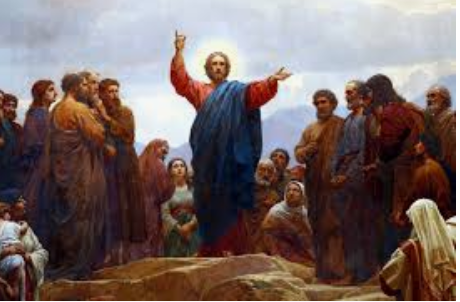POSTMILLENNIALISM IN THE GOSPELS (1)
 PMW 2024-097 by Kenneth L. Gentry, Jr.
PMW 2024-097 by Kenneth L. Gentry, Jr.
THE APPROACHING OF THE KINGDOM
In the Gospels we discover Christ being introduced to Israel and the world through the ministry of John Baptist (Luke 1:76). John himself even fulfills prophecy by being the Messiah’s forerunner (Isa 40:3; Matt 3:3). He prepares the way for Jesus by preaching: “Repent, for the kingdom of heaven is at hand” (Matt 3:2). And Jesus picks up on this theme as he begins his own ministry in Mark 1:14–15:
“And after John had been taken into custody, Jesus came into Galilee, preaching the gospel of God, and saying, ‘The time is fulfilled, and the kingdom of God is at hand; repent and believe the gospel.’”
Let’s consider three crucial factors flowing out of this important pronouncement.
First, Jesus declares “the time” has arrived. What is “the time” to which he refers? It surely speaks of the prophetically-anticipated time, the time of the coming of David’s greater Son to establish his kingdom. We may surmise this in that he immediately adds: “the kingdom of God is at hand.” After all, the Father sent Christ into the world in “the fullness of time” (Gal 4:4; Eph 1:10), to initiate the “favorable year of the Lord” (Luke 4:16–21). This favorable year of the Lord is also called “the acceptable time . . . the day of salvation” (2 Cor 6:2). It is the very day righteous men and angels in the old covenant long desired to see (Matt 13:17; Luke 2:28–30; 10:24; John 8:56; Heb 11:13, 39–40; 2 Pet 1:10–11).
Second, Jesus proclaims that the time “is fulfilled.” He does not say “the time may be fulfilled — if you will receive the promise.” Or: “the time will be fulfilled at some unknown date in the future.” Rather he forthrightly declares that the God-ordained time is fulfilled now. Because of this Paul can later call this “the now time” (2 Cor 6:2; cf. Rom 3:21–26; Eph 3:10; 2 Tim 1:9–10). Though John and Jesus announce that the time is fulfilled, Jerusalem did not recognize the coming of “the time” (Luke 19:44; cf. Matt 23:37).
[image error]For more information and to order click here.
Navigating the Book of Revelation (by Ken Gentry)
Technical studies on key issues in Revelation, including the seven-sealed scroll, the cast out temple, Jewish persecution of Christianity, the Babylonian Harlot, and more.
See more study materials at: www.KennethGentry.com
Third, “the kingdom of God is at hand.” Since “the time” has arrived, and since it is “fulfilled,” the kingdom of God is finally close, being right at hand. The coming of the kingdom does not await the distantly future return of Christ. Rather, during his first coming, at the very opening of his ministry, Jesus preaches that “the kingdom of God is at hand.”
All of this is crucial to our eschatological understanding — and in keeping with postmillennial expectations. The kingdom’s early new covenant revelation declares its nearness in time, not its potential nearness, and certainly not its distance. As a result of this glorious reality, Jesus promises that some of his hearers would live to see the kingdom’s acting in great power in history: “There are some of those who are standing here who shall not taste of death until they see the kingdom of God after it has come with power” (Mark 9:1).
Thus, not only is his kingdom present in his ministry, but some of his disciples will actually live to see its exhibition in power. This exhibition would not be immediately, for some of his disciples would die first. Yet this must occur within the lifetimes of others, for “some” standing there would witness it.
The announcement in Mark 9:1 apparently refers to the dramatic AD 70 destruction of the temple and the removal of the Old Testament worship system. The writer of Hebrews anticipates the old covenant’s conclusion: “When He said, ‘A new covenant,’ He has made the first obsolete. But whatever is becoming obsolete and growing old is ready to disappear” (cf. Heb 8:13; 12:25–28). This occurs as a direct result of Jesus’ prophecies of the altering of divine worship (John 4:21–23) that results from the destruction of the temple (Matt 21:33–46; 22:1–7; 23:31–24:34).
Openness Unhindered (by Rosaria Butterfield)
Dr. Butterfield goes to great lengths to clarify some of today’s key controversies. She also traces their history and defines the terms that have become second nature today-even going back to God’s original design for marriage and sexuality as found in the Bible. She cuts to the heart of the problems and points the way to the solution.
See more study materials at: www.KennethGentry.com
THE ESTABLISHING OF THE KINGDOM
Jesus opens his ministry with the declaration that “the time” is “fulfilled” and the “kingdom of God” is “at hand.” Thus, we should expect the kingdom to appear in Jesus’ ministry and in the Gospel record. This is precisely what we discover in the Gospels.
Perhaps one of the clearest Gospel proofs of the presence of the kingdom is Matthew 12:28: “if I cast out demons by the Spirit of God, then the kingdom of God is come unto you.” Since Jesus does cast out demons by the Spirit of God, then the kingdom has come. The very fact that Christ invades Satan’s kingdom and takes away possessions (demoniacs, Matt 12:25–29) proves that the kingdom comes during his ministry.
Luke records for us another announcement of the kingdom’s presence in Luke 17:20–21:
“Now having been questioned by the Pharisees as to when the kingdom of God was coming, He answered them and said, ‘The kingdom of God is not coming with signs to be observed; nor will they say, “Look, here it is!” or, “There it is!” For behold, the kingdom of God is in your midst.’”
Notice that Christ answers the Pharisees’ specific question regarding “when” the kingdom should come. He answers them in the present tense, informing them that the kingdom is present now. It is not awaiting a future, visible, Armageddon-introduced manifestation, complete with signs; it exists spiritually now and among them.
Because of this, even during his ministry men enter into it: “The Law and the Prophets were proclaimed until John; since then the gospel of the kingdom of God is preached, and everyone is forcing his way into it” (Luke 16:16). Christ’s kingdom is not awaiting some distant future coming.
[image error]For more information and to order click here.
" data-image-caption="" data-medium-file="https://postmillennialworldview.com/w..." data-large-file="https://postmillennialworldview.com/w..." class="alignright size-full wp-image-211" src="https://postmillennialworldview.com/w..." alt="" />Perilous Times: A Study in Eschatological Evil (by Ken Gentry)
Technical studies on Daniel’s Seventy Weeks, the great tribulation, Paul’s Man of Sin, and John’s Revelation.
See more study materials at: www.KennethGentry.com
During his trial under Pilate, the Lord speaks directly of his kingship and kingdom:
“Jesus answered, ‘My kingdom is not of this world. If My kingdom were of this world, then My servants would be fighting, that I might not be delivered up to the Jews; but as it is, My kingdom is not of this realm.’ Pilate therefore said to Him, ‘So You are a king?’ Jesus answered, ‘You say correctly that I am a king. For this I have been born, and for this I have come into the world, to bear witness to the truth.’” (John 18:36–37a; see also: Matt 27:11; Mark 15:2; Luke 23:3)
Here Jesus defines his kingdom as something other-worldly, rather than as a this-worldly political kingdom. His kingdom differs from Caesar’s political kingdom — and it differs from the dispensationalist’s political conception of the Messianic kingdom. He claims to have his own “servants” (even though they do not fight with sword to defend Him, John 18:36b). He even clearly states “I am a king” (John 18:37a). And, as we might expect, given our study of Mark 1:14–15, he states that he has come into the world for the purpose of being king (John 18:37c). Thus, his kingdom is already present for we read of Jesus’ affirmation that he is a king: “You say correctly that I am a king” (John 18:37a).
In all of this we see Christ himself stating that he was establishing his Messianic kingdom during his earthly ministry in his first coming. This is precisely the position of postmillennialism, though this contradicts the position of dispensationalism.
To be continued.
Click on the following images for more information on these studies:


[image error]
Kenneth L. Gentry Jr.'s Blog
- Kenneth L. Gentry Jr.'s profile
- 85 followers



